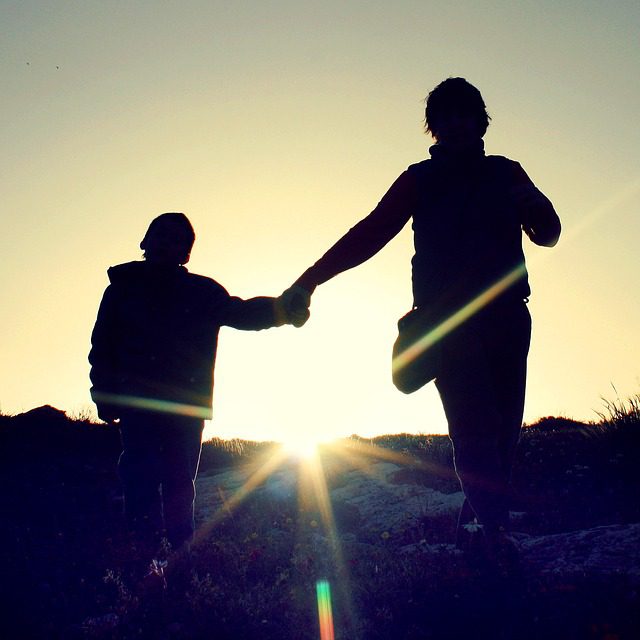It went down like this:
“Mommy, I have a joke for you, listen. How long is a Chinese man?”
[with a raised eyebrow and a bit of trepidation] “I don’t know… how long?”
“No, that’s the joke… HOW LONG is a Chinese man. Get it?”
“Um… that’s a little bit racist. And inappropriate. Don’t repeat it, ok?”
“How is that racist?”
“Well… It’s making fun of how a certain kind of name sounds. It’s called a microaggression. It’s really making fun of all people who are from Asia, whose names sound a certain way. Like [brother’s best friend who is at our house all the time]. You see why that’s not cool, right? To make fun of people for not looking or sounding like us? Some people will make fun of ANYthing that is not American, or not like white people. We don’t do that.”
“Okay.”
“Where did you hear that joke anyway?”
“[Name of Trusted Adult in her life.]”
“Well, [Trusted Adult] should know better. Let’s say something next time, if they tell jokes like that again.”
Shit. This is hard, y’all. Do you find yourself having conversations like this on a regular basis? I don’t know if just the age my kids happen to be; or the current cultural/political climate; or the fact that, once you start to take notice, you realize that kids hear and repeat stuff like this constantly. In any case, this real-time, passing conversation at my house last night is a good example of how we can engage issues of racism, in the moment; and begin to systematically de-program our kids’ white privilege with some measure of intention.

The truth is, parenting is hard, in general. Parenting the resistance is even harder. It’s not just racism we are battling daily; it’s misogyny, homophobia, Christian entitlement, classism, liberal elitism… pick your poison. It’s rough out there. We aren’t the only voices in our kids’ lives. And, for the most part, that’s good news. It takes a village, and all that. But sometimes the other voices in our village are part of the problem. (Story above= Exhibit A). Other kids, other kids’ parents, dance and music teachers, coaches, neighbors… We need them all as “trusted adults” for our children, but we can’t control everything they say/do/model. Even with the best of intentions, sometimes these folks who love our kids so well might model a behavior that we don’t want to see mirrored.
There may be a time and place to engage that teacher/coach/neighbor in a hard conversation about that culturally/racially obtuse thing they just said in front of your child… But the bigger challenge is to cultivate an awareness in your own household, creating space for an ongoing conversation with your family. It’s an art, not a science–there is no one way, no right way to broaden the world for your kids and make sure they don’t grow up to be racist assholes. But here are a few everyday practices that will make your kids mindful of their own privilege; and hopefully empower them to speak up when they hear problematic language from the other adults (or kids) in their life.
- Don’t engage the humor. I didn’t laugh at the joke and THEN tell her the problem with it. I told her, with a completely straight face, that it wasn’t funny. If you first crack a smile, you have acknowledged the legitimacy of the joke. Other people’s names/accents/facial features aren’t a joke, ever.
- Don’t shame it, but name it. My daughter is 9. She was repeating something that she heard, and she didn’t know better. So any kind of punishment or shaming in that moment would have been counter-productive. Instead, wait for the teaching moment and use it to give your kids some language to both identify the issue, and articulate a response. Develop your family’s equality lexicon. By not overreacting in the moment, you keep the topic from becoming anxious, and your kids will be far more likely to tell you the next time they hear something like this.
- Give next steps, and follow up. Ok, she got a freebie on that one. But now that we’ve had the conversation, she knows better, so we expect better. Once you’ve named the issue, think through some scenarios where you might want your child to respond differently next time, and have them practice through some dialogue. (Even if it’s just saying “that’s not cool” to a friend who repeats something inappropriate).
- Ongoing conversation. Remember that this is not a one-time teaching moment, but a lifetime of continuing to name and address issues of privilege and inclusion. I heard a great quote recently from the Mom Hour podcast: “For the hard conversations instead of having one 60 minute conversation, have 60 one minute conversations.”
- Engage other conversation partners. Hopefully some of the trusted adults in your child’s life are people of color; family friends, neighbors, teachers, church leaders, coaches, etc. Ask them to share their own experiences, as appropriate. This can be tricky, because it is not the job of your one black friend to educate your kid re: racism. It’s on all of us. But hopefully, you have a good village around you, and it is filled with a diversity of faces and voices that will come to the table and help you paint your kids a fuller picture of the world in which they live.
That’s a world I sure hope we are working to make better for them… and one that I trust they will make better than we ever imagined. These practices work for a wide range of topics, beyond race and privilege. Use them to talk about any kind of prejudice, from homophobia to misogyny to including kids with special needs. Just keep talking, folks. It’s hard. But it’s so important.
For further discussion:
More Than Words: 10 Values for the Modern Family, is available in paperback or Kindle edition.












